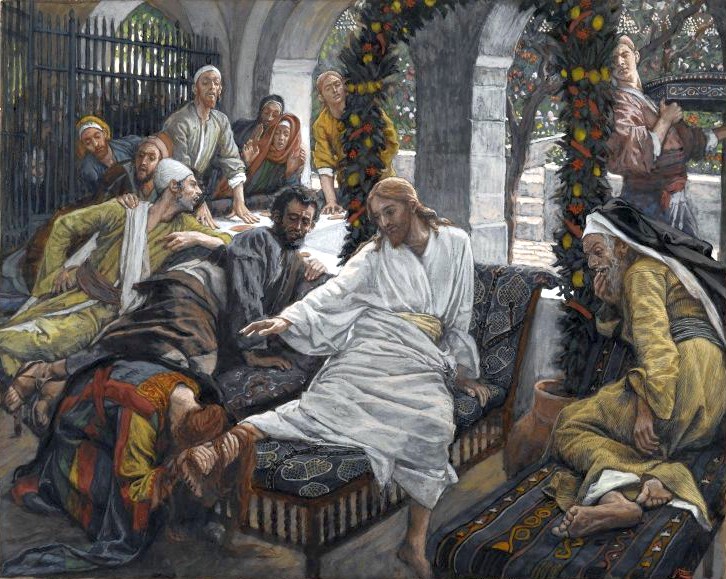Mary knew. Jesus had told his disciples more than once, but when the immediate crisis passed, they forgot. But Mary knew. She could hear it in Jesus’ words, see it in his face; and she could feel it when in the presence of Pharisees or priests. His enemies lay in wait, and they would not wait much longer. Her emotions, raw from grieving her brother’s death, then celebrating his return from the dead, now turned to grief and dread for what she saw ahead, and now, the darkness seeming to close in on every side. She could not prevent the terrible events; could not even slow their approach. But she must do something.
Six days before the Passover, Jesus came to Bethany, where Lazarus lived, whom Jesus had raised from the dead.
Here a dinner was given in Jesus’ honor. Martha served, while Lazarus was among those reclining at the table with him. —John 12:1-2.
Six days before the Passover. In a scant two weeks, Jesus will be betrayed, flogged, crucified, buried, and risen. He, the Lamb of God, undoubtedly knows how short the time before his sacrifice. Mary of Bethany, sister to Martha and Lazarus, does not know. But she is so attuned to Jesus that she senses something ominous.
Not long before, her brother Lazarus had lay on his death bed. Jesus, in faraway Galilee, heard of the illness and announced his intention to come to Judea, to Bethany. But on his previous trip to Judea, the Jews had tried to stone him. His disciples reminded him of the danger, but he resolved to come anyway.
In the event, he arrived four days too late, or so it seemed. Lazarus died and was buried before Jesus’ arrival. And then—and then—it still staggered Mary’s imagination to recall what he had done. He had gone to Lazarus’ tomb and called to her brother to come out—and he did!
She had gone from bitter tears to grateful ones, astonished ones. And now, today, the two men she loved most sat at dinner together, talking and laughing, enjoying life to the full—yet, she sensed, surrounded by danger. Martha coped with the wild emotional swings the way she coped with everything: busying herself with housework. If she saw what loomed in the future, she didn’t show it. But Mary did, and decided to do the only thing she knew to express her gratitude for restoring her brother, for the beautiful truths he shared about his Father, for the loved he radiated at all times, and for the peril he faced.
Then Mary took about a pint of pure nard, an expensive perfume; she poured it on Jesus’ feet and wiped his feet with her hair. And the house was filled with the fragrance of the perfume.—v. 3.
Nard is a variety of lavender, so we can imagine the fragrance. And imagine sixteen ounces of lavender poured out in a short time! No wonder the house was filled with its fragrance. Like Jesus life and ministry, it was healing and sweet and restful. And bound to attract attention. Of all kinds.








